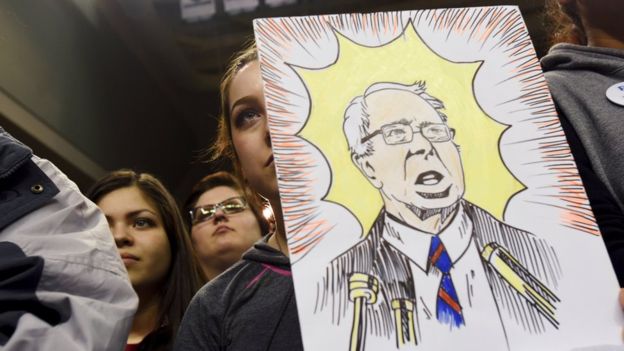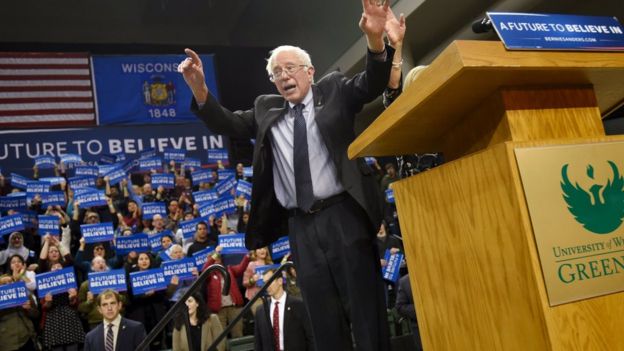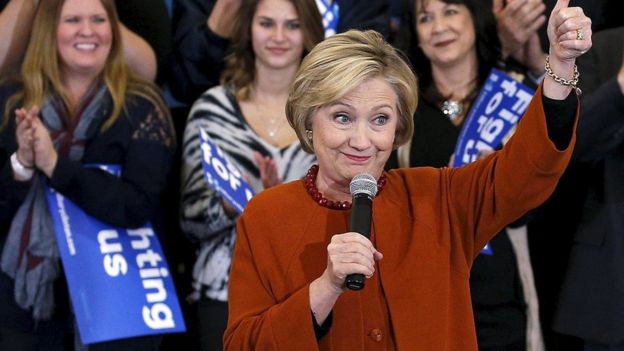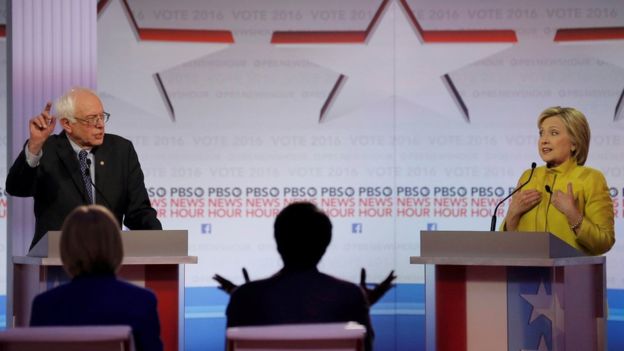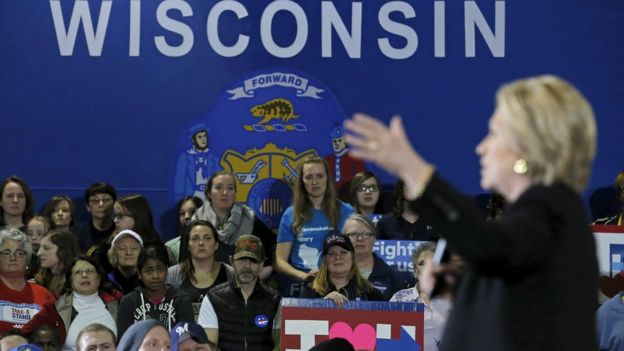US election 2016: Gloves come off for Clinton and Sanders
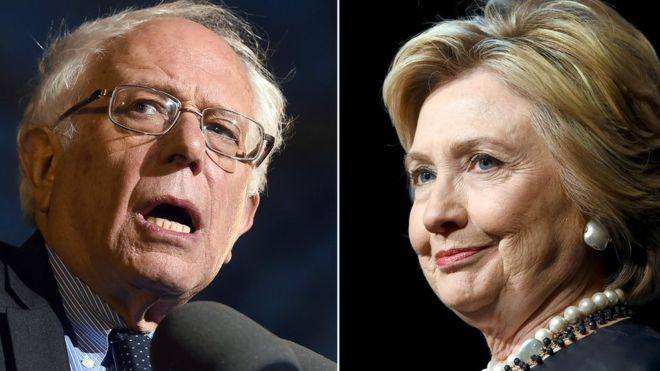
It's crunch time in the Democratic race, and if the past week is any indication, nerves are starting to fray.
The fratricide within the Republican Party is getting much of the national attention, but the two remaining Democratic candidates — and their supporters — are starting to swing some sharp elbows.
The Wisconsin primary on Tuesday marks the beginning of the Democratic presidential campaign's endgame. More than half the pledged delegates have already been apportioned, and only a few truly landscape-altering battlegrounds — New York, Pennsylvania, New Jersey and California — remain on the calendar.
Mr Sanders can claim momentum, with wins in five of the last six contests, but he needs a sizeable victory in Wisconsin if he wants to properly set the stage for the critical coming contests and cut into Mrs Clinton's 263 delegate lead.
It's enough to set both candidates on edge.
On Thursday, when confronted by a Greenpeace activist in New York about whether she could address climate change while taking donations from the fossil fuel industry, Mrs Clinton showed a rare flash of anger.
"I am so sick of the Sanders campaign lying about me," she said. Her campaign would later assert that the former secretary of state, like Mr Sanders, takes donations from individuals employed in the energy sector but is prohibited from accepting money from corporations.
t was a moment of emotion for a usually carefully controlled candidate — and the Sanders camp quickly responded.
"If the Clinton campaign wants to argue that industry lobbyists giving thousands of dollars to her campaign won't affect her decisions if she's elected, that's fine," Sanders adviser Jeff Weaver said. "But to call us liars for pointing out basic facts about the secretary's fundraising is deeply cynical and very disappointing."
It was just one of numerous recent shots between the two campaigns. When Mrs Clinton unveiled manufacturing proposals on Friday, a Sanders spokesperson said the former secretary of state has embraced "policies that have decimated the manufacturing industry … and eliminated millions of jobs across the country".
At a campaign event, Mr Sanders offered criticisms of Mrs Clinton's six-figure speeches to Wall Street firms, her foreign policy views and her position on environmental issues, as his supporters heartily booed.
On Saturday Mrs Clinton noted that she has been a "proud Democrat my adult life" — drawing a contrast with Mr Sanders, who is a self identified "democratic socialist" who serves in Congress as an independent.
"I think that is kind of important if we are selecting someone to be the Democratic nominee of the Democratic Party," Mrs Clinton said.
"I think the secretary is getting very nervous," Mr Sanders countered on Sunday, noting that polls show him doing better than Mrs Clinton against Republican front-runner Donald Trump.
"I think we've got a lot of young people's vote, working-class people's vote," Mr Sanders said. "I think we're on the way to a victory if we can win the Democratic nomination."
This tension in the Democrat race is a relatively recent development. Last autumn, Mr Sanders famously said during the first debate that he was "sick and tired" of talking about Mrs Clinton's email server imbroglio — passing on a chance to target what could have been a key weakness in his main opponent.
When Mr Sanders entered the race, he said he wasn't interested in running a negative political campaign. It was a strategic decision that has lead to some recent second-guessing among advisers within the candidate's campaign, as witnessed by a surprisingly pessimistic story in the New York Times on Monday.
"The central complication with Bernie is that he never wanted to cross into the zone of personal attacks because it would undercut his brand," Sanders adviser Tad Devine told the Times.
That hasn't stopped acrimony from flaring among the two candidates' supporters, however — even in typically restrained states like Wisconsin.
Lisa Stubek, a state representative who endorsed Mrs Clinton early in the campaign, says she's caught fire from pro-Sanders constituents in the ultra-liberal state capital of Madison.
"Bernie Sanders supporters are pretty relentless, unfortunately, as far as their support and as far as attacking those who support anyone but their candidate," she said. "And that's not true of everyone, but certainly there is a core group of Bernie Sanders supporters here in Madison who do that."
While Ms Stubek says that the campaign has largely been above-the-board, things have taken a turn for the worse.
"I think certainly when you have Bernie Sanders out there stretching the truth or out-and-out lying, things do heat up," she said. "I'm glad that Hillary is out there defending her record. More than anything people in our state want the facts."
Another Madison-area Democratic representative, Melissa Sargent, says she decided not to endorse a presidential candidate in part because the noise between the two candidates would drown out her efforts to address other issues and local campaigns.
"When I go to doors and I'm stumping for my local candidates, I can talk about the things that I want to talk about and I can hear authentically what folks are saying," she said. "It felt like I wouldn't be able to navigate the path that I am with these other races."
Democrats in Wisconsin are quick to note that their challenges are nothing compared to what the Republicans are facing, as their two leading candidates engage in harsh negative attacks and exchange barbs over their wives and martial infidelity.
Brett Hulsey, a former Wisconsin Democratic state representative who is backing Mr Sanders, called the Republican campaign a "food fight circus".
"Democrats are still fighting by the Queensberry Rules," he said, drawing a boxing analogy.
He cautions that while tempers seem to be flaring among Democrats at this point, things will eventually calm down. If Mrs Clinton wins, he plans to support her — and he predicts most Sanders backers will follow suit.
"We're in the middle of the fray right now," he said. "I remind everybody to take a few deep breaths and remain calm. I've worked every presidential since 1980 for Jimmy Carter. I've seen this movie before."
At a rally in Madison on Sunday night it seemed an era of good feelings may have returned. Mr Sanders spoke to a crowd of 4,200 for more than an hour and made no mention of his Democratic opponent. Instead, he focused his criticism on Mr Trump and Republican Governor (and former candidate) Scott Walker.
He also seemed to be broadening his perspective.
"This campaign is about more than just electing a president of the United States, although I would very much appreciate your support," he said. "It's about creating a political revolution."
After the event, Jess A Weber — who had travelled to Madison from Illinois to volunteer for the Sanders campaign — said she appreciated that Mr Sanders has tried to run a positive campaign.
"He continues to pull focus back to the message and back to our strength in unifying, coming together instead of dividing and bringing anyone down," she said.
On the campaign trail in Janesville on Monday, however, Mr Sanders was back to swiping at his opponent for her past positions on international trade and commerce.
"I have voted against and led the opposition to every one of these disastrous trade agreements," Mr Sanders said. "Secretary Clinton has supported virtually every one."
The Democratic race is far from a bare-knuckle fight, but the candidates aren't done trying to draw blood.
Политика конфиденциальности | Правила пользования сайтом
